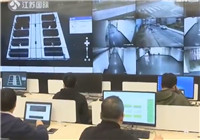East China’s Jiangsu province witnessed booming development of digital and emerging industries last year, as is evidenced by the leap-forward growth of big data and artificial intelligence and the upgrading of the information technology with the IT sector contributing 30% to the province’s entire GDP.
System developer Drivingeye Technology is the success of the incubation by Jiangsu Digital Information Industry Park.
Over the past few years, Drivingeye Technology seized the big data + business opportunity to gain an annual average sales growth of 30% year on year and listed on the new third board market last year to usher in a new era of development.
As one of the important carriers of the development of digital economy, Jiangsu Digital Information Industry Park has boosted the cultivation of small and medium-sized enterprises since 2017.
The park established a venture capital fund with the investment on enterprises amounting to nearly 2 billion yuan aside from the the establishment of the province's first digital information industry institute and the introduction of Tsinghua University research team to solve technical problems for the local enterprises.
The park has so far incubated more than 50 startups with the total output value adding up to more than 10 billion yuan.
In the process of digital economy development, a large number of data are trapped in the information island to hibernate, becoming a big obstacle to the development of the big data industry.
New attempts have been made in many places. At the end of last year, Nantong set up the province's first big data management bureau to connect the date from the economic and technological development zone, the big data industry park, Alibaba Jiangsu Cloud Computing Data Center as well as the tax, business and other government departments so that the data functions more smoothly between enterprises and governments.
Latest statistics show that Jiangsu recorded over 2 trillion yuan of economic aggregate last year from the information economy, an increase of 24% year on year and contributing over 30% to the province’s entire GDP. The digital economy is giving a strong impetus to the economic development in Jiangsu.
China's digital economy reached 22.58 trillion yuan or about 3.4 trillion US dollars in 2016, ranking second globally and accounting for 30.3 percent of the national GDP.
As of June 2017, there were 3.89 billion internet users around the world, of which 751 million were in China, the most of any country worldwide.
Digital economy, also known as the internet economy, is based on digital computing technologies, comprising new business models such as e-commerce, cloud computing and payment services.
China's digital economy grew significantly higher than the overall economy, becoming a major engine of growth.
Within a fast growth technology in China, it is functioning as a driver of revenue and enabler of new business models for many Chinese companies, including China e-commerce giants Alibaba and JD.com.
Insiders expects China's digital economy to be valued at 32 trillion yuan and account for 35 percent of the whole GDP by 2020, before taking up over half of the country's GDP by 2030.






